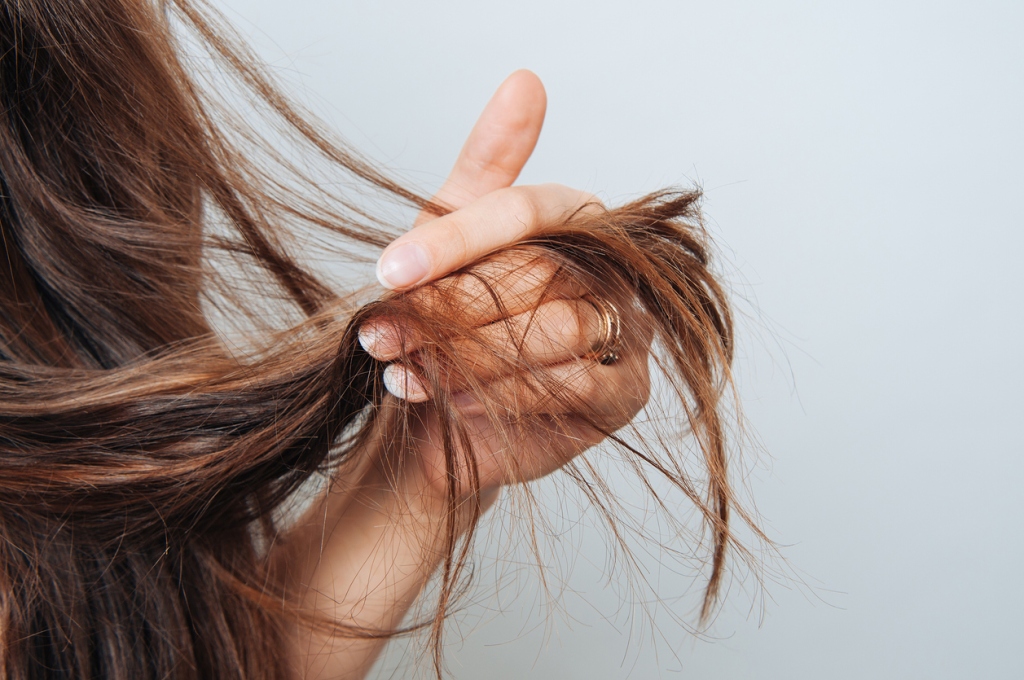
Everyone wants a full, beautiful, healthy head of hair. Most people think of hair problems as cosmetic issues and rely on beauty products for solutions. However, just like healthy skin and healthy teeth, healthy hair is more than a sign of cosmetic beauty, and issues with hair health affect more than just the way you look.
Hair Products Can Mask Underlying Issues
Common hair problems can include dandruff, dullness, brittleness, and split ends. Most of us head to the salon for a trim to get rid of those unsightly split ends. For most other hair concerns, we hit the beauty aisle for spendy hair products that promise to strengthen, fortify, and hydrate hair, add shine, or eliminate dandruff. While these products can make your hair look healthier, the real causes of hair problems can indicate underlying health issues. Addressing these root causes will improve your overall health, which means healthier hair.
10 Hair Problems and What They’re Telling You
1. Split Ends
When we notice split ends, we assume it’s just time for a haircut. Most of us just clip them off and never think about why they occur. Split ends indicate dehydration. If you have lots of split ends on a regular basis, drink more water and avoid things that exacerbate dehydration, like coffee and alcohol. You can prevent and easily treat these hair problems. Following these tips can help reduce them.
- Turn down the heat: washing your hair with scalding hot water damages the follicles.
- Check the ingredients: avoid using harsh shampoos with harmful sulfates, parabens, and even formaldehyde.
- Protect your hair before styling: avoid prolonged use of heated styling tools at high temperatures. Reducing the temperature should also create less frizz.
2. Premature Graying Hairs
Going gray prematurely happens to both men and women. While graying hair is rarely associated with a health problem, it is rarely a source of joy for people in their early 20s. In some cases, premature graying can be caused by a deficiency of vitamin B12. Pituitary or thyroid gland problems can also cause premature graying. Graying hair can be reversible in some cases once the vitamin deficiency or other problem is treated.
3. Dandruff
If you experience annoying dandruff, understanding the underlying causes can give you important insights into your health. The first item to examine is your existing shampoo. Harsh chemicals can irritate the scalp, so listen to your body and pay attention when any hair product causes discomfort, pain, itching, or irritation.
Some people may think dandruff is a sign of washing your hair too much. However, in mild cases, frequent washing can exfoliate scales on your scalp. More severe cases require treatment with a shampoo containing zinc.
As with so many other hair problems, an unbalanced diet that lacks sufficient vitamin B can cause dandruff. Leafy vegetables, eggs, milk, legumes, and sweet potatoes are rich in vitamin B. You should also add foods with healthy oils to your diet.
Dandruff-like flaking can indicate scalp psoriasis. If your dandruff is yellow instead of white, you may have seborrheic dermatitis which requires doctor-prescribed treatment.

4. Dryness
Dry hair often indicates a dry scalp, which can lead to dandruff. Aging and the hormonal changes women go through during menopause can also cause dry hair. Environmental conditions like living in a hot, dry climate can contribute to dry hair.
Overwashing, using harsh shampoos that strip your hair of natural oils, and heat damage also contribute to dryness. Shampooing your hair every day is not recommended. Some medications and medical illnesses can cause extremely dry hair. If you’ve ruled out all other possible causes, you may want to talk to a doctor.
5. Hair Loss
If you notice excessive hair loss in yourself or someone you know, it may indicate a more serious health problem. While we all lose up to hundreds of hairs every day, noticeably abnormal hair loss can be a sign of eating disorders like anorexia nervosa or bulimia. In some cases, it can be a side effect of certain medications. Hair loss is also associated with iron deficiency, which can easily be treated by modifying your diet or taking iron supplements. Because there are many causes that can contribute to hair loss, it’s best to talk to your doctor.
6. Pattern Baldness
Male pattern baldness is associated with coronary heart disease. Hair loss, in general, is associated with heart health. People with pattern baldness and other types of hair loss have an increased risk of developing hypertension (high blood pressure). A study has also shown that male pattern baldness is a major risk factor for COVID-19. Coronary heart disease does not, however, cause vertex baldness.
7. Dullness
People usually consider dull hair as a simple cosmetic issue that can be fixed with a salon treatment. Certain medical deficiencies or overexposure to certain elements are common reasons for issues like dull hair. Dullness can result from too much sun or chemical exposure. Doctors also believe that dullness and brittleness may be signs that you’re not absorbing enough protein, phosphorus, sulfur, and selenium. If those vitamins and minerals are missing from your diet, you might also notice an effect on your teeth.
8. Excessive Oiliness
Certain hair types are naturally more oily than others. Natural oils collect at the root of the hair follicle, creating oiliness on the scalp. Some people dislike the damp appearance this gives to their hair. Luckily, there are ways to control overly oily hair, including dry shampoos and techniques like washing your pillowcases regularly.

Overusing hair products, exerting lots of physical energy, and other environmental factors can contribute to oiliness. Surprisingly, so can over-washing your hair. Oiliness is more common in straight hair and can be made worse by certain products. If you’re concerned about excessive oiliness or scalp irritation, contact a dermatologist.
9. Brittleness
A diet low in protein and vitamins can cause your hair to become dull, dry, and brittle. It can also make your hair fall out. Certain nutrients can make your hair stronger and thicker, especially iron, zinc, vitamin B, and folic acid. A diet rich in fish, nuts, leafy greens, and legumes also help fortify hair. Brittle hair can also be caused by overly treated hair that has been repeatedly colored, bleached, chemically treated, or styled with heated tools.
10. Bald Patches
If you have bald patches that appear suddenly and only affect a limited area, you may have a form of alopecia called alopecia areata. This skin disorder is believed to be an autoimmune disorder in which the body attacks hair follicles. In most cases, lost patches of hair regrow within 12 months or so, but alopecia can result in total baldness in certain people. Contact a doctor if you notice patchy hair loss, loss of eyebrow or eyelash hair, or thinning of your beard or body hair.
Pingback: Blood Pressure, Pulse, Temperature, and Respiratory Readings: What Do Your Vital Signs Say About Your Health? | The Avidity Medical Design Blog